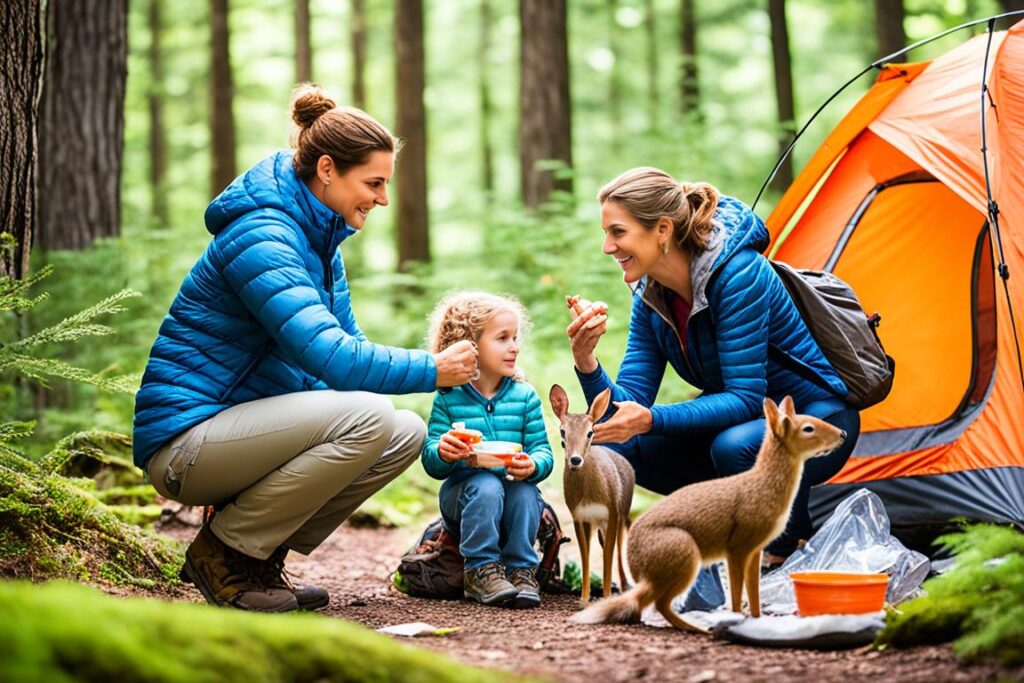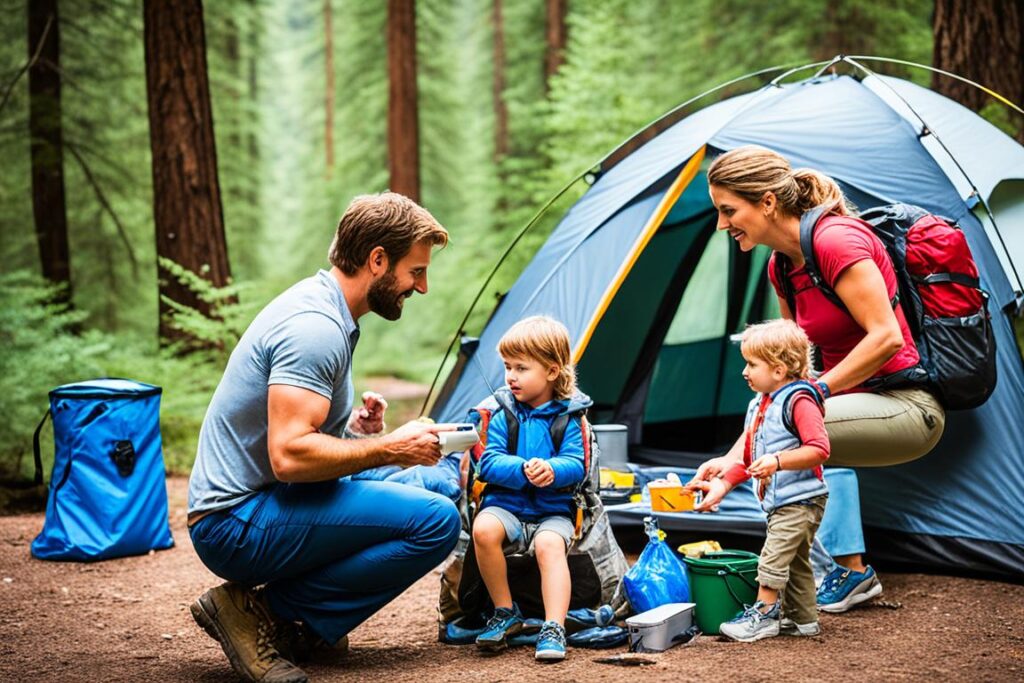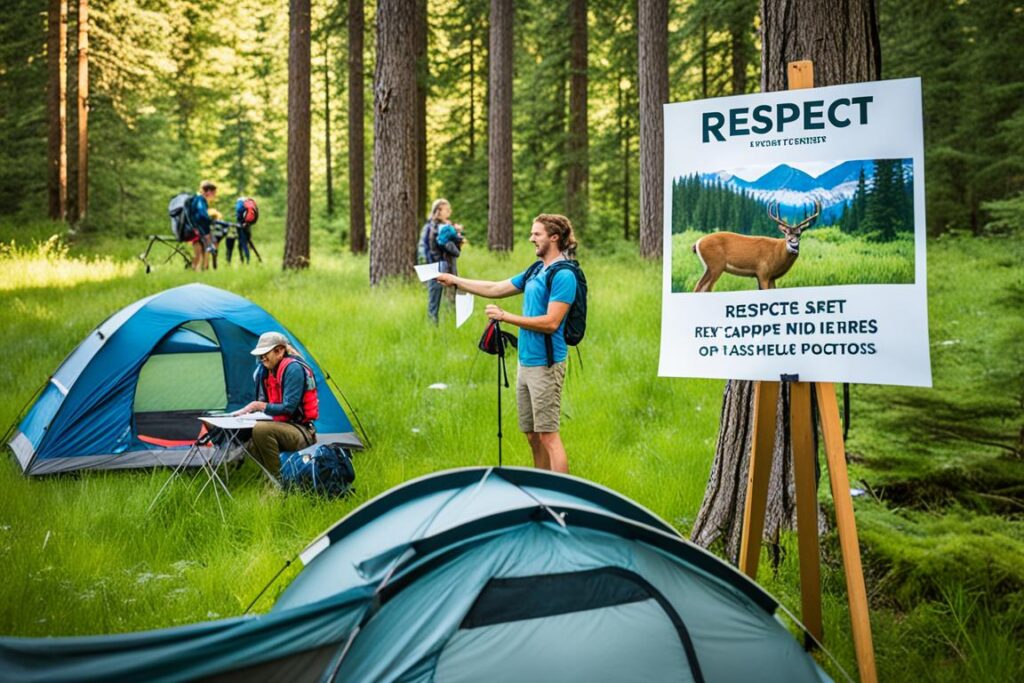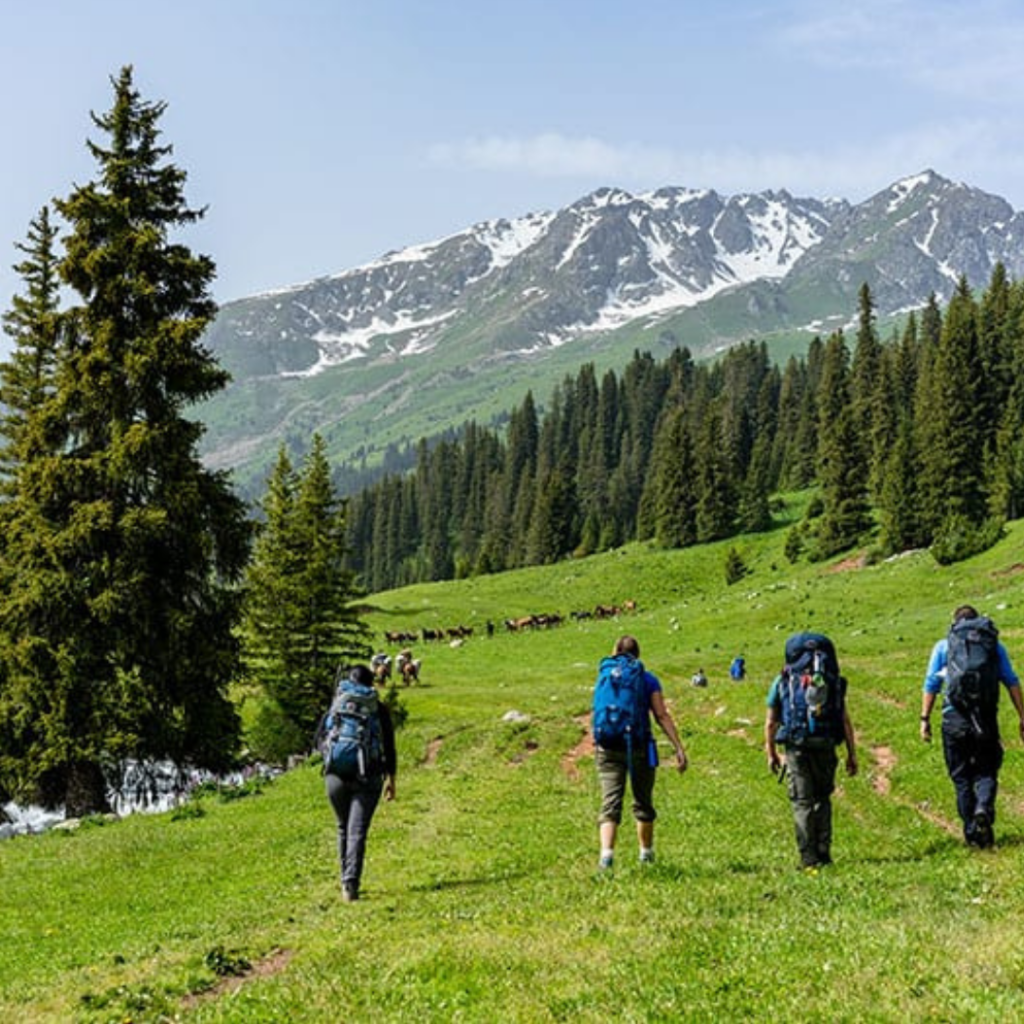This summer, national parks will see more visitors. It’s crucial to focus on wildlife safety and respect. Capturing park moments on social media is big but not without risk. Dangerous encounters with wildlife have increased. Here are 10 tips for a safe and fun trip, based on expert and park advice.
Key Takeaways:
- Keep a safe distance from wildlife to protect yourself and the animals.
- Observe wildlife from afar without invading their personal space.
- Be mindful of wildlife behavior and respect their natural habitat.
- Follow park regulations and practice Leave No Trace principles.
- Carry bear spray and stay on designated trails for added safety.
Keep Your Distance and Observe from Afar
Keeping your distance is vital for wildlife safety. Stay 25 yards away from bison and 100 yards from bears and wolves. Never change their behavior or get too close. Taking photos within six feet can be dangerous. Observing from afar keeps you and the animals safe.
Key Takeaways:
- Stay at least 25 yards away from bison and 100 yards away from bears and wolves.
- Avoid taking pictures within six feet of animals.
- Observe wildlife from a safe distance to protect yourself and the animals.
Be Mindful of Wildlife Behavior and Habitat
Understand and respect wildlife to enjoy a safer camping trip. Don’t use loud sounds to attract animals; it causes stress. Be careful near water; you might find nesting birds or turtles. Wear clothes that won’t confuse sea turtle hatchlings. This way, you help keep wildlife safe and have fun safely.
Key Takeaways:
- Avoid honking horns or making loud noises to avoid stress for wildlife.
- Watch out for nesting birds and turtles when walking on beaches or climbing rocks.
- Choose shoe colors that won’t confuse sea turtle hatchlings.
Follow Park Regulations and Leave No Trace
It’s key to follow park rules and Leave No Trace to keep visitors and wildlife safe. Don’t feed or touch animals to prevent aggressive behavior. Properly dispose of trash and food to avoid wildlife dependence. When in bear areas, carry bear spray for safety. Stick to paths to protect the environment. Following these steps is good for you and nature.
Key Takeaways:
- Don’t feed or touch wildlife to avoid aggressive behavior.
- Dispose of trash and food waste properly to prevent habituation.
- Carry bear spray when visiting bear country for added protection.
- Stay on designated trails to minimize environmental impact.
Keep Your Distance and Observe from Afar
One big wildlife safety rule is to keep your distance. Stay 25 yards from bison and 100 yards from bears and wolves. This keeps animals acting naturally and you safe. Don’t take pictures closer than six feet. Watching from a safe place keeps everyone well.
It’s important to honor wildlife and their homes in national parks. It can be tempting to get close for photos. But, putting the animals first helps them live without stress.
Wild animals can surprise you. Even simple actions can turn risky. Always be alert. Don’t do things that make animals react badly.
“When approaching wildlife, maintain a safe distance and give them the space they need to feel comfortable,” says Lisa Thompson, a park ranger at Yellowstone National Park. “By respecting their boundaries, we can coexist with wildlife and protect both their safety and ours.”
Remember, these animals are wild. Admire them from a distance. Let them live naturally. Seeing wildlife up close is amazing. Follow the rules to keep them and you safe.

Tip: Use Binoculars and Zoom Lenses
Binoculars and zoom lenses help you see animals up close safely. You can enjoy their beauty from a distance.
Recommended Wildlife Viewing Areas
| National Park | Wildlife Viewing Area | Featured Animals |
|---|---|---|
| Yellowstone National Park | Lamar Valley | Grizzly Bears, Wolves, Bison |
| Grand Teton National Park | Oxbow Bend | Moose, Bald Eagles, River Otters |
| Yosemite National Park | Glacier Point | Black Bears, Mountain Lions, Mule Deer |
Be Mindful of Wildlife Behavior and Habitat
When camping in national parks, understanding wildlife behavior is key. Always respect their homes. If you know and respect wildlife, camping becomes safer and more fun. Here’s what you should do when out in nature:
1. Avoid Loud Noises
Don’t honk horns or yell to get animals’ attention. Loud sounds scare them and mess up their day. It’s best to keep things quiet for the animals’ sake.
2. Watch Your Step
Be careful on beaches and around rocks. Animals might live in those spots. Look for signs of nests and walk softly to not bother them.
3. Mind Your Shoes
The color of your shoes matters with wildlife. In places with sea turtles, wear shoes that aren’t white. White shoes can mess up the turtles’ sense of direction. Go for shoes that are dark or natural instead.

4. Observe from a Distance
Seeing wildlife up close is amazing. But, it’s crucial to watch from far away. This keeps both you and the animals safe. Stay at least 25 yards away from bison and 100 yards away from bears and wolves.
“Respecting wildlife and their home is vital to save our natural wonders. Sticking to these tips helps us share nature in peace.”
Following these tips and being kind to wildlife will make your national park trip great. Always remember, looking after wildlife is something we all should do.
Follow Park Regulations and Leave No Trace
It’s key for visitors and wildlife safety to follow park rules and Leave No Trace. You help keep the natural world and its inhabitants safe.
It’s vital not to mess with the animals. Don’t feed or touch them. Doing so can make them act mean and disturb their routine. Always keep safe around wildlife.
Getting rid of trash right keeps animals safe. Throw your trash and leftover food in the proper bins. This helps animals not get used to human food. It keeps them safe from danger. Plus, it makes the park nicer for everyone.
When you’re in bear areas, bring bear spray for safety. This makes you more sure and keeps you and the bears safe.
Finally, stick to the set paths. It keeps nature as untouched as possible. Following the park’s rules is not just about you. It’s for the park’s health and to make the visit great for everyone.



